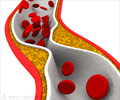So-called 'selfish' gene controls expression of a protein that helps to remove cholesterol from blood vessels.

TOP INSIGHT
Boosting MeXis levels in mice models with blockages in blood vessels, made cells more effective at removing excess cholesterol.
"What this study tells us is that lncRNAs are important for the inner workings of cells involved in the development of heart disease," said Dr. Peter Tontonoz, senior author of the study. He is also the Frances and Albert Piansky Professor of Pathology and Laboratory Medicine at the David Geffen School of Medicine at UCLA. "Considering many genes like MeXis have completely unknown functions, our study suggests that further exploring how other long non-coding RNAs act will lead to exciting insights into both normal physiology and disease."
In the study, researchers found that mice lacking MeXis had almost twice as many blockages in their blood vessels compared to mice with normal MeXis levels. In addition, boosting MeXis levels made cells more effective at removing excess cholesterol.
In the next phase of the study, researchers will further explore how MeXis affects the function of cells in the artery wall and will test various approaches to altering MeXis activity. The researchers are interested in finding out if MeXis could be targeted for therapy of cardiovascular disease.
"The idea that lncRNAs are directly involved in very common ailments such as plaque buildup within arteries offers new ways of thinking about how to treat and diagnose heart disease," said Dr. Tamer Sallam, the study's lead author. Sallam is an assistant professor in the department of medicine and co-director of UCLA Center for Cholesterol Management. "There is likely a good reason why genes that make RNAs rather than proteins exist. A key question for us moving forward is how they may be involved in health and disease."
Source-Eurekalert
 MEDINDIA
MEDINDIA




 Email
Email










